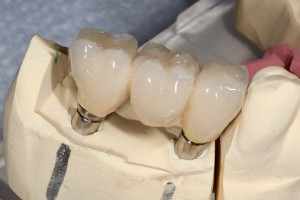Improvements in Dental Implant Technology
Learn about the advancements that are making dental implants better than ever

The main reason dental implants are such an excellent solution for missing teeth is that the titanium implant peg actually bonds with the bone in the jaw to create a strong and stable base for the replacement tooth or teeth. However, other important aspects of dental implant technology also help to promote successful outcomes to dental implant surgery.
CAD Imaging
When placing a dental implant, it is extremely important to consider the biomechanics of the situation. Dental implants are often subject to higher bite forces than natural teeth because the patient lacks periodontal ligaments that would normally provide a sense of pressure when biting down. The dental implant itself must be engineered to withstand this, and it must be placed in such a way that the bond between the implant and the bone will not be exposed to undue stress. The use of Computer Aided Drafting software has made this process much easier for dentists. Often, dental surgeons take a CT scan of the patient’s mouth and then plan the procedure using the software to ensure the placement is perfect.
Implant Peg Coatings
Another area where dental implant technology is advancing is in the surfacing of the implant pegs. Researchers have found that a textured peg provides better osseointegration between the titanium and the bone. Also, researchers are investigating various types of anti-microbial coatings for the pegs which could provide additional protection against the risk of infection.
Mini Implants for Dentures
Individuals who have lost all or most of the teeth in their upper or lower arch can benefit from implants designed especially to support full or partial dentures. Sometimes called mini implants, these pegs for implant-supported dentures are smaller than traditional implant pegs, which is important because individuals with extensive tooth loss will have also suffered some bone loss. The smaller implant pegs require less bone and are therefore easier to place without necessarily requiring a bone graft.
Would You Like More Information About Dental Implants?
If you are interested in the possibility of using dental implants to replace your missing teeth, please contact California Dental Group and request an appointment with one of our experienced implant dentists.




